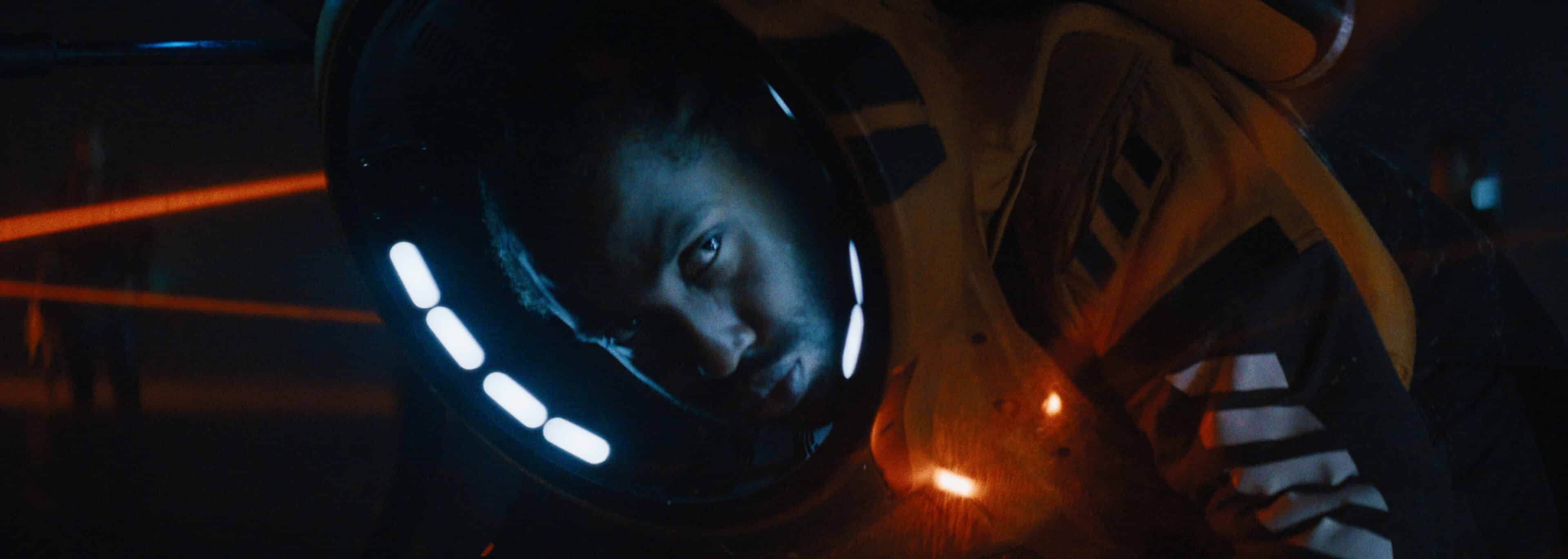
© 2020 Universal Studios. All Rights Reserved.
Though perhaps better known as a writer and actor, The Invisible Man marks Leigh Whannell’s third turn as a director. His first foray into life behind the lens came with Insidious: Chapter Three, the third film set in the series that he created and starred in. Next came the simply extraordinary Upgrade, a gritty slow-fi science-fiction action thriller that deserves to be seen by everyone. His first film was firmly horror, the second science-fiction, with The Invisible Man he combines both genres with excellent results.
Our story, also written by Whannell, follows Elisabeth Moss’ Cecilia after her abusive ex Adrian (played by Haunting of Hill House‘s Oliver Jackson-Cohen) takes his own life. Believing that she’s finally free of her tormentor, she’s shocked to find that he’s left her his fortune. As she tries to readjust to her new circumstances, she begins to suspect that Adrian might not be dead after all, but will anybody believe her?
The original The Invisible Man, based on the novel by H. G Wells, was released almost one hundred years ago in 1933. It seems only right then that the story gets a modern update, and Whannell has clearly worked hard at re-calibrating the essence of Wells’ story into something that today’s audience can relate to. He shifts focus from the titular man to his abused partner. The whole film is a deep dive into domestic abuse, the trauma it inflicts and the scars it leaves behind. Given the climate of the world today, it feels not only timely, but important.

© 2020 Universal Studios. All Rights Reserved.
Moss plays Cecilia with elegance, capturing the fear and paranoia experienced by victims of abuse to a tee. Her performance also channels some of the best female characters that we’ve seen on screen: Virginia Madsen’s Helen from Candyman, and Linda Hamilton’s Sarah Connor (the T2 version), and elicits similar sympathy for her plight. It’s not just the damaged version of Cecilia that Moss does well, the early moments at home with friend James and his daughter are full of warmth, offering glimpses of what the woman was like pre-abuse.
Backing up Moss’ hard work onscreen is Whannell’s assured direction. Having written genre cinema for so long, he knows just how to play with an audience. His talents translate perfectly to the screen, highlighting him as a filmmaker to watch. In many ways, through his direction, Whannell interacts with the viewer in the same way that Adrian toys with Cecilia. He has all the control and systematically strips the viewer of everything they believe to be safe. This makes for an exceptionally unnerving watch, there’s a palpable tension to every frame which doesn’t let up, no matter how hard you wish for it.

© 2020 Universal Studios. All Rights Reserved.
The opening of the film is, in itself, a masterclass in suspense. Here Whannell plays around with the sound design to really ramp up the heart-rate. Sudden noises in the still of the night always feel louder than they are, and this is one such feature that is captured superbly. The score mirrors Whannell’s on screen actions and is yet another piece in the jigsaw that makes The Invisible Man such a harrowing watch. The music builds and swells as the movie progresses, gradually reaching almost suffocating heights.
As important as Whannell’s direction is, some of the true magic of the film lies within the script. Writing has obviously formed a massive part of Whannell’s career up to now and his experience shines through. Gone is all the clunky exposition in favour of more subtle approaches. In one such example, we find out what Cecilia does for a job via the sweater that she wears. This lack of any need to explain every little thing to an audience typically only comes from seasoned writers and here Whannell offers a textbook lesson of how script writing should be done.

© 2020 Universal Studios. All Rights Reserved.
The work with our invisible foe has clearly been meticulously planned out; somehow you’ll find yourself afraid of what is essentially just an empty frame – who knew a blank corner of a room could be so nightmarish? The concept of this invisible man, as with Whannell’s previous film Upgrade, feels plausible. It’s an important factor, as without it the film could have fallen into silly over-the-top territory.
It’s a little crazy to think that were it not for Tom Cruise’s abysmal The Mummy film tanking, we might not have this version of The Invisible Man. Instead we would have had some over-the-top budget blockbuster with Johnny Depp hamming up the screen. Thankfully though, the planned ‘Dark Universe’ was put to bed…though if they were to all tap into the same vein as this, we could be tempted to revisit the idea, especially if Larry Fessenden’s Depraved were to become the Frankenstein of the world.
Uncomfortably tense, The Invisible Man casts an important light on the trauma of abuse. Led beautifully by Moss’ performance and backed up by Whannell’s impressive talent, The Invisible Man captures you immediately and then relishes in toying with you for the next two hours.
The Invisible Man is in cinemas February 28.
Kat Hughes is a UK born film critic and interviewer who has a passion for horror films. An editor for THN, Kat is also a Rotten Tomatoes Approved Critic. She has bylines with Ghouls Magazine, Arrow Video, Film Stories, Certified Forgotten and FILMHOUNDS and has had essays published in home entertainment releases by Vinegar Syndrome and Second Sight. When not writing about horror, Kat hosts micro podcast Movies with Mummy along with her five-year-old daughter.

Latest Posts
-


Film News
/ 4 days ago‘Magazine Dreams’ with Jonathan Majors secures U.S. release date
A release date has been secured for the Jonathan Majors’-led Magazine Dreams. Briarcliff Entertainment...
By Paul Heath -


Film News
/ 4 days ago‘Gazer’ movie trailer; Ryan J. Sloan’s debut feature
Check out this promo for a new movie titled Gazer, a film which marks...
By Paul Heath -


Film News
/ 4 days agoHere’s the second trailer for Netflix’s big budget ‘The Electric State’
A second trailer has dropped for Netflix’s big early 2025 release The Electric State...
By Paul Heath -


Film News
/ 4 days agoA couple of clips from Robbie Williams biopic ‘Better Man’
A couple of clips for the upcoming Robbie Williams biopic Better Man have landed...
By Paul Heath










